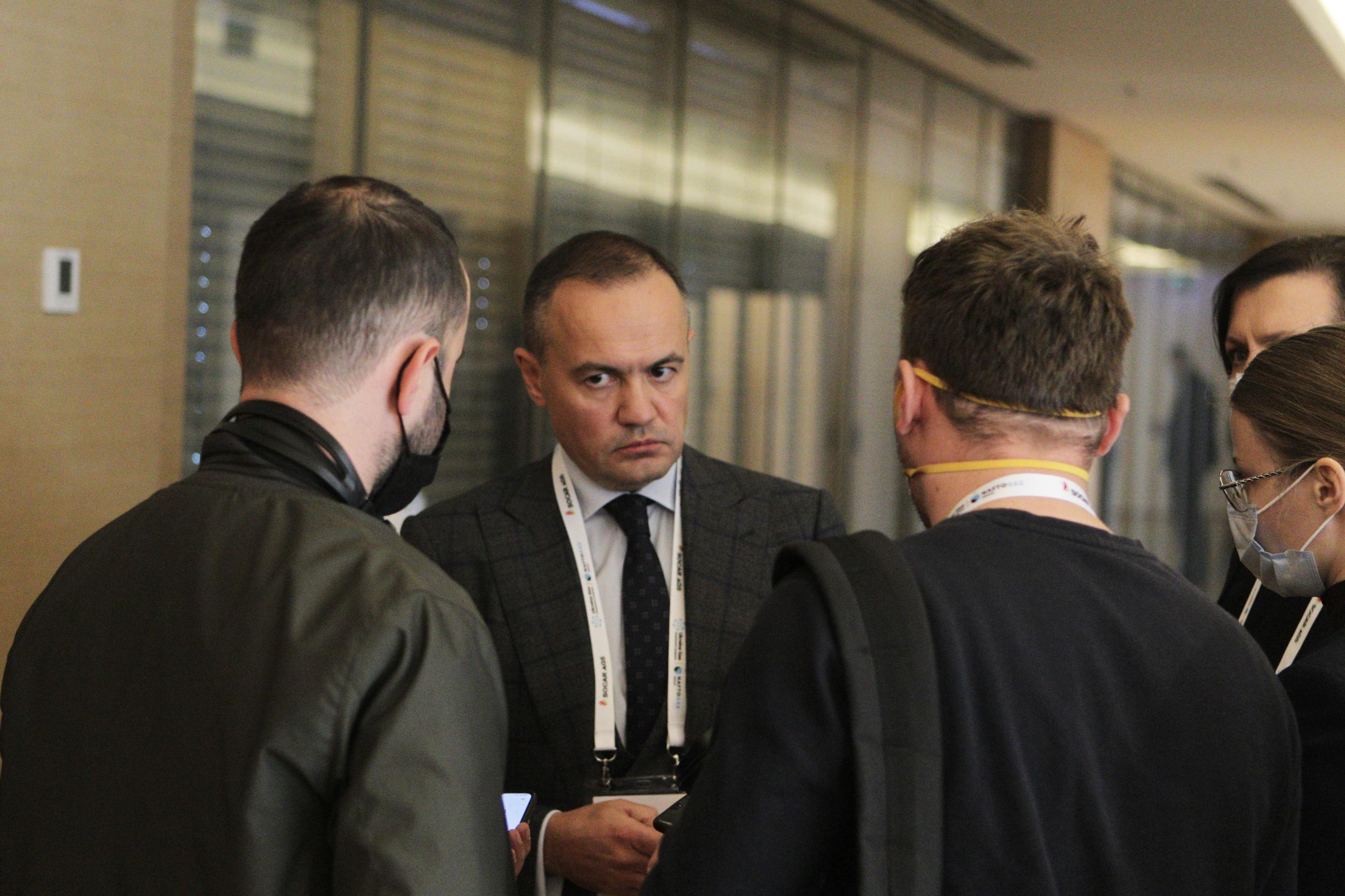
DTEK CEO Maxim Timchenko at a conference in Kyiv, October 2021.
Future Publishing via Getty Images
For CEO Maxim Timchenko, the war started on February 22 when shells exploded at a coal-burning power plant owned by DTEK in the eastern Luhansk region of Ukraine, knocking it offline and causing fires. The attack was more than just a continuation of the hostilities that had simmered since 2014, it was a prelude.
DTEK, owned by the investment company of billionaire Rinat Akhmetov, is Ukraine’s biggest non-nuclear power generator. Before the war its eight fossil fueled power plants and renewable energy projects provided about 30% of Ukraine’s electricity. Those plants have become more important than ever before after Putin’s forces attacked and seized the Chernobyl and Zaporizhzhia nuclear complexes. In better times Ukraine got 60% of its power from nuclear; but nearly half of its reactors are now offline.
Timchenko praises DTEK’s 60,000 employees, especially the power engineers venturing out to repair damaged caused by Russian attacks, only to have their repairs destroyed a day later. So far five of DTEK’s workers have died in attacks. DTEK is stockpiling coal as quickly as possible, though one plant, he says, will run out of fuel in less than two weeks because Russian attacks have severed rail lines.
A more immediate concern, he says, is the security of the nuclear sites. The Chernobyl complex is cut off from the grid and using backup power to run the pumps that continuously add water into containment pools that hold spent uranium fuel rods. Though this atomic fuel is depleted, it remains extremely dangerous. Timchenko insisted on Friday that backup generators could run out of fuel in less than a week, causing the pumps to stop and the cooling ponds to boil dry. At that point the nuclear material could heat up to thousands of degrees, catch on fire, and spew radioactive particles into the skies.
It’s a possibility almost too ghastly to think about. But Timchenko does, and he begs NATO countries to impose at least a partial no-fly zone covering the air above nuclear power plants and civilian refugee corridors. “My message to the world,” he says, “is to please shelter the sky over the power plants. And make an absolute embargo” on Russian oil and gas. “I’m grateful to the U.S. for its decision on Russian oil,” Timchenko says. “But people should realize that all revenues from selling oil are converted into bullets to kill Ukrainians.”
But wouldn’t a no-fly zone, with NATO jets intercepting Russian sorties, lead directly to World War III? “People are thinking about the risk that World War III could start, but that’s a remote risk,” said Timchenko in an hour-long Zoom call. “An immediate risk is the chance of nuclear disaster,” and one that cold be worse than the Chernobyl meltdown of 1986.
Timchenko is not the only prominent Ukrainian warning that Putin was already stockpiling corpses for an orchestrated “false flag” attack at the nuclear plants that could lead to nuclear catastrophe.
Russian officials reportedly said on Saturday that specialists from Russia’s nuclear agency Rosatom had been dispatched to both power plants to ensure the sites are secure.
Timchenko doesn’t think it a coincidence that Putin timed his invasion order for the early hours of February 24 — just after Ukraine’s power grid operators initiated an important and long-planned test, which involved switching off the interconnection to Russia’s grid and operating Ukraine as an electricity island. Timchenko says the timing was a strategic aid to Putin — enabling him to attack Ukrainian power infrastructure without any risk of disruption on the Russian side.
Before the war Ukraine’s grid operators were working toward disconnecting from Russia because they wanted to establish a new link to the European grid. Timchenko expects to see the political and technical prerequisites soon finalized. Getting an additional 2 gigawatts of power from Europe would help take some pressure off Ukraine (which averages 12 gw of demand), and DTEK.
Timchenko doesn’t want to believe that Russia attacked nuclear power stations. “It’s not even terrorism. It’s something out of mind.”
It’s heart-wrenching for Timchenko, 47, who grew up in the eastern Donbass region, excelled at Donetsk State Academy of Management, the University of Manchester, and London Business School. In 1999 he started at PricewaterhouseCoopers, then went to work at Rinat Akhmetov’s System Capital Management (SCM) conglomerate. In 2005 SCM spun out DTEK; Timchenko has been CEO ever since. He’s invested heavily in coal mining, gas production, and wind turbines. After Putin’s initial 2014 invasion he moved DTEK headquarters west to Kyiv. The company last year generated roughly $300 million of Ebitda on about $1.8 billion of revenue.
War is hard on capital intensive balance sheets. In 2015 DTEK had to restructure its debt, which it did again last year, and may need to again, considering that since the war started DTEK’s electricity customers have stopped mailing in payments. Timchenko anticipates some forbearance on $1.7 billion in debt, and has absolute confidence that Akhmetov, Ukraine’s richest man, will be able to recapitalize his businesses, which also include metals mining, real estate, insurance, media, railroads and agriculture. As Akhmetov told Forbes last week: “We will start to rebuild the country to make it happier and more prosperous. On my end, I will spare no expense or effort to achieve this goal.”
Timchenko says that if NATO is not yet ready to close the skies above even Ukraine’s nuclear power plants and humanitarian corridors, he hopes western powers will at least put up some cash to help keep the lights and heat on — the costs of operating Ukraine’s power plants and grid collectively come to $250 million a month. Not only are generators like DTEK now going unpaid, but they’ll face hefty repair and reconstruction bills when the war is over.
DTEK is Ukraine’s leading energy investor, with projects like this wind farm in Botievo, Ukraine.
© 2016 Bloomberg Finance LP
It pains Timchenko that 20% of Kyiv and all of Mariupol are without power. He calls the continous shelling and bombing of Mariupol “genocide,” and wonders whether Putin intends a re-enactment of Hitler’s 1941 Siege of Leningrad. Half a million people have had no electricity or heat for a week. “It’s killing us that we cannot help these people.”
He and his executive team are still in Ukraine, near the western border. They received some Starlink satellite internet receivers from SpaceX, but haven’t needed to use them yet. He’s leading by example in staying focused, controlling his emotions, keeping calm. For now. “People should realize it’s not just a war against Ukraine. It’s war against all the civilized world.”
He doesn’t want to believe that Russia has already attacked nuclear power stations. “It’s not even terrorism. It’s something out of mind.”






